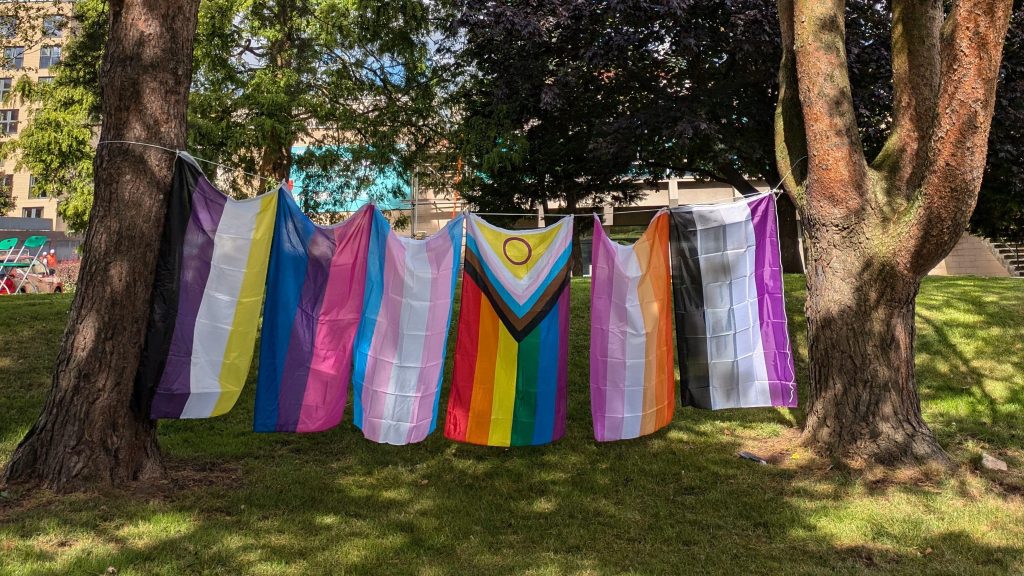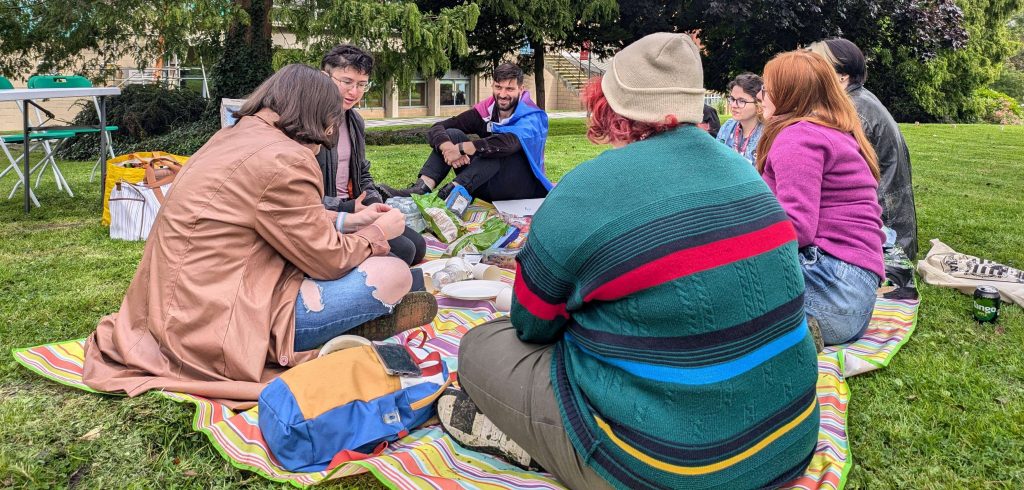”Non-binary is a term for people whose gender doesn’t sit comfortably with ‘man’ or ‘woman’. Non-binary identities are varied,” and this means that every non-binary person is unique (Stonewall.org.uk). Being an active and supportive ally means treating everyone with respect and being open to each person’s gender, identity, and preferences.
You may feel like you have to get it right all the time, but that isn’t the key to being an ally. The best thing you can do is stay informed and be willing to make mistakes, and learn from them. We’ve pulled together some top tips to help you be an ally to non-binary people.
Being an active ally
- Introduce yourself with your pronouns and state them in your email signature or social media profile. By doing this, you’re helping create a safe space where people can feel more comfortable sharing their own pronouns.
- If someone has shared their pronouns with you, use them. Correctly using pronouns without question shows that you respect who they are.
- You can ask how to use their pronouns. For example, if someone’s pronouns are he/they, they may prefer one over the other or like for them to be switched up. Do bear in mind that people’s preferences can be fluid and change over time and may be influenced by their surroundings and how comfortable they feel in any given situation.
- Use more inclusive language. When referring to a group instead of using terms such as ‘guys’ or ‘ladies and gentlemen’ try using ‘folks’, ‘everyone’, ‘ya’ll’ or ‘pals.’ You can also try using words that define the relationship rather than the gender of the people, such as ‘partner’, ‘sibling’, ‘friend’, and ‘children’.
- You can correct people. If someone is openly out and people use the wrong pronouns, as an ally you can gently correct them and let them know what pronouns to use going forward.
- Avoid assuming someone’s gender or identity by using ‘they’ when someone’s gender or identity is unknown. This may seem odd, but you already do this! If your friend is telling you a story about someone and you don’t know the gender or identity of this unnamed person, you’ll usually use a gender-neutral pronoun like ‘they’ to refer to this unnamed person. Try this whenever you meet or hear about someone for the first time since names and appearance are not accurate indicators of gender or identity. While it’s important to never assume someone’s gender or identity, after your initial introduction, make sure you ask what their pronouns are.
- Don’t be afraid to be corrected. If someone corrects you, it isn’t personal. Instead, try to reframe your thinking. Each correction is about helping you learn a new skill. Apologise, make the correction and move on.
- Understand that gendered spaces can be challenging for a non-binary person. Using a bathroom or changing room can be difficult, so be supportive and respectful of how they choose to use that space.

Advice from Our Alumni
We asked a couple of non-binary alumni to share their thoughts with us about how people can be active allies. Keep reading to learn about how to support non-binary people in different settings, not making assumptions, and how being an ally means more than using pronouns correctly.
Q1: What can people do to be active allies for non-binary people?
“When it comes to allyship, I think the best thing to do is to let me take the lead. Let me confirm my pronouns, because that means I feel it’s a safe space to do so.” – Jake (They/Them)
“At the moment, there is increasing hostility towards the trans and non-binary community as a whole. Being a good ally might start with using the right pronouns, but it should also include things like supporting pride events, campaigning, and writing to your MP to demand better access to gender-affirming care and address other key issues. Also, don’t make assumptions. Non-binary comes in many flavours. We don’t all look androgynous – some of us may present more feminine or more masculine. Non-binary is about how we feel on the inside, which may or may not affect how we show ourselves on the outside.” – Sarah (She/They)
Q2: What is something that people do that they think is helpful, but you would prefer that they didn’t do?
“For me, something that might be supportive but isn’t, is when you apologise loads and loads if you use the wrong pronouns. It’s okay, don’t worry! I know you don’t mean it maliciously, let’s just carry on with our day together :)” – Jake (They/Them)
“Introducing us to people as non-binary without our consent. I see why you might think it’s helpful and avoids assumptions, and yes, we might be out and proud – but we aren’t necessarily out in every setting. Given the hostility towards the trans and non-binary community, we often have to risk assess each situation and decide if it’s safe to be out. Just ask how we want to be introduced and which pronouns to use. Some of us use they/them. I use she/they, and which one I use depends on the situation. I prefer they/them in writing and she/they in person.” – Sarah (She/They)

Learn more about allyship and non-binary people
We’ve covered the foundations but there’s lots of external resources where you can learn more about non-binary genders and identities, including more ways to be an ally.
- If you’re a beginner to gender identity, check out Amnesty’s helpful guide.
- Stonewall is a leading LGBTQ+ organisation. You can read their article about 10 ways to be an ally or learn more about LGBTQ+ terms. You can also read a first-hand account of being a non-binary person in the UK today.
- Trans Equality has a page where you can read about non-binary people and how to be respectful.
- Read an article by Them to practice your gender-neutral pronouns.
Support for our LGBTQ+ community
If you or someone you know is looking for support, we have different resources available to help with anything you’re going through.
- If you’d like to change your name or need extra support during your studies, check out our LGBTQI+ Students webpage.
- Find out more about our wellbeing and counselling support for any issues or topics you’d like to discuss.
- For help with any other information or finding a community, visit our LGBTQ+ webpage.
